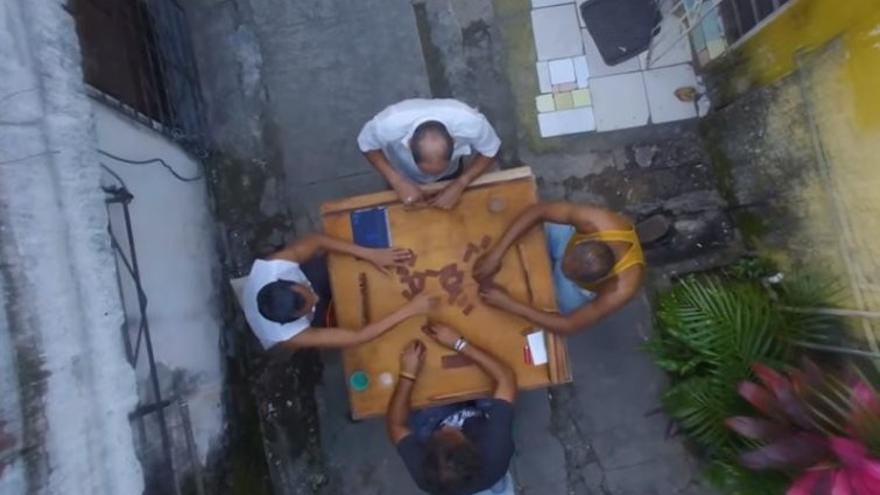
![]() 14ymedio, Luz Escobar, Havana, 5 February 2018 — How would the inhabitants of Cuba react if suddenly a Dubai millionaire wanted to buy the island for 5 billion dollars? That is the question the filmmaker Eduardo del Llano asks in his short film Domino, a part of the series Los cuentos de Nicanor (The Tales of Nicanor), which he has published on his YouTube channel under the label of Sex Machine Productions.
14ymedio, Luz Escobar, Havana, 5 February 2018 — How would the inhabitants of Cuba react if suddenly a Dubai millionaire wanted to buy the island for 5 billion dollars? That is the question the filmmaker Eduardo del Llano asks in his short film Domino, a part of the series Los cuentos de Nicanor (The Tales of Nicanor), which he has published on his YouTube channel under the label of Sex Machine Productions.
The story of the short, which revolves around four friends who interrupt the routine of their domino game on hearing this unusual news, overflows with critical humor about citizen misinformation, decision making without popular consultation and the question of what, really, is Cuba.
From this absurd opening emerge different positions and interests that reflect both the fears and doubts that assail the four men before the tempting offer to sell their own country.
The premiere of this piece, number 14 in the series, has arrived a year after the start of its filming. The director says he wanted to capture “the different types of Cubans” around the table and to weave a plot that is a example of “deep Havana.”
“There is a sense that things are happening, that decisions are being made, that domino pieces are being played and no one knows until after it has already happened and that feeling is always disturbing,” Del Llano emphasizes, speaking about the context that led him to shoot Domino.
The well-known character Nicanor O’Donnell, played by Luis Alberto García, after learning that the nation is going to be bought, starts to calculate — with the other three players La Ciencia (Néstor Jiménez), Sangremono (Omar Franco) and Pepe, El Víctima (Miguel Moreno) — how much money will be paid to each inhabitant once the transaction is done
Arithmetic that replaces any kind of the nationalist outburst and the comments that spring from the table have more to do with the pragmatism of survival than with any patriotic pose. The country is up for auction with its human beings included and in the acceptance of that situation there is no pain or bitterness, only pragmatism.
The actress Lola Amores makes a brief appearance as the same character she played in Santa and Andrés, Carlos Lechuga’s movie censored by the Cuban authorities. The seconds she appears in the screen work as a nod towards the viewer and in solidarity with the young filmmaker.
The men’s first calculations of earnings lead the players to think that each resident on the island will receive 10 million dollars when the purchase of the national territory is completed, an illusion that passes quickly because El Sciencia (Science) is in charge of correcting the mathematical error; he confirms that they will only get 500 dollars per capita.
The calculation opens the way to reflection on the egalitarianism that has ruled many aspects of the national economy and the political discourses, on introducing the possibility that the distribution will be a function of need.
There is also no shortage of irony in reference to the external enemy. “And if all this is just a CIA maneuver (…) it would be a simple way to end communism,” whispers Pepe El Víctima, suspicious, but he recovers immediately: “500 dollars is crap but it’s a lot more than half of all Cubans have ever seen in their damn life.”
Without pain or nostalgia, the concerns of the friends run the gamut, including whether they will have to embrace the Islamic faith or emigrate after the sale of the country. “What is Cuba, us or the land?” The question triggers a doubt about who will be included in the distribution, touching on exiles, government opponents, the terminally ill and Cubans about to be born.
The friends are also incredulous that the capital might be used in collective works: “They can no longer grind us down with all that talk about how they are going to invest in social plans.”
The sparkling dialogue shows Del Llano’s skill in filmmaking where he combines the irrational with sharp and real criticism. “Typical. They are talking about selling the country and no one tells us anything, they don’t even consult us,” complains Nicanor, for whom “there is no journalist, not one” who dares to report what is happening.
The mockery goes one step further until it touches on the authorities. “When they get that money and they’re left with no territory to govern, does the government stop being a government?”
Without tears or lamentations, in the tenement passageway and while slapping down the dominos, the four men express their conviction that the decisions will be taken in a place very distant from their opinions. All they can do is wait for the Island to pass from one hand to another, and so it has been for as long as they can remember.
________________________________
The 14ymedio team is committed to serious journalism that reflects the reality of deep Cuba. Thank you for joining us on this long road. We invite you to continue supporting us, but this time by becoming a member of 14ymedio. Together we can continue to transform journalism in Cuba.
